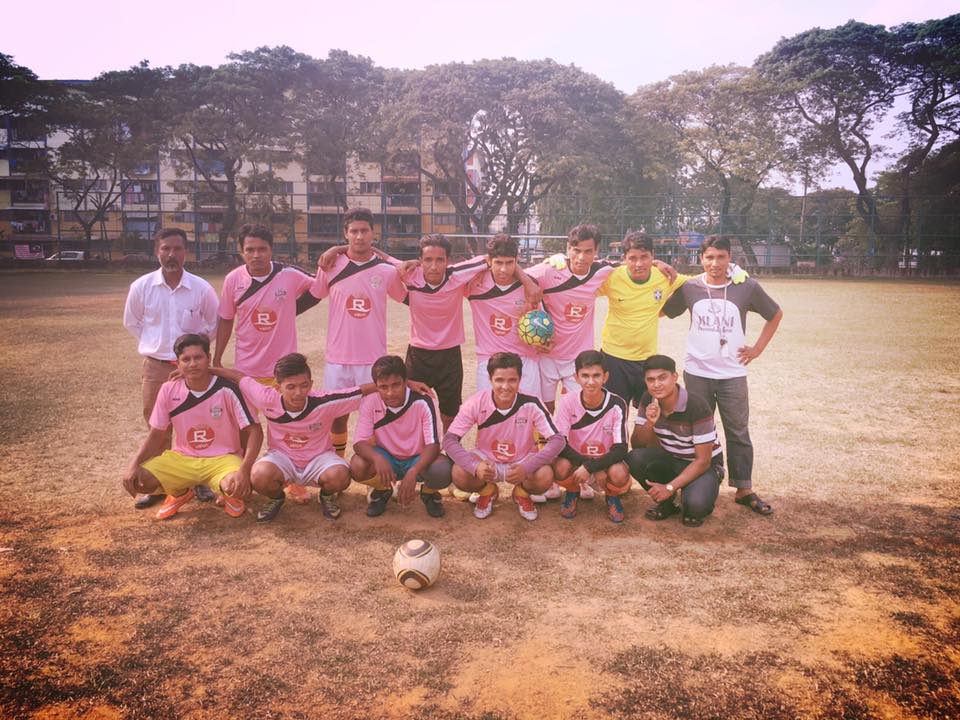Racing from one end of the football pitch to another, the players in bright yellow and pink jerseys pass the ball between them, weaving around their opponents, tackling each other and occasionally, committing a foul.
As a small crowd cheers them on, it looks like any other amateur match taking place on a Sunday afternoon in countless cities around the world. But on this pitch in Malaysia‘s capital Kuala Lumpur, the teams face a challenge like no other.
The players are young refugees from the Rohingya Muslim minority in predominantly Buddhist Burma, who are trying to tackle the prejudices they face in society in one of the few arenas they truly feel equal.
For Mohammed Farouque, whose perilous journey to Malaysia included a journey on a crowded boat and a stay in people-smuggling camp in the jungle, the sense of liberation is something new.
“Since my birth, I haven’t known freedom,” said Farouque, one of the refugees who runs the Rohingya Football Club in Kuala Lumpur.
“We can openly play football here. In Myanmar [Burma] we are not even allowed to go out of our houses. I had to leave my country to save my life.”
[related]
Tens of thousands of Rohingya have fled to Muslim-majority Malaysia to escape harsh discrimination in their homeland, where they are not recognised as citizens.
After the perilous and sometimes deadly voyage to Malaysia, their problems are far from over.
The 150,700 refugees and asylum-seekers in Malaysia live in the shadows of the society, barred from working officially or receiving formal education. Often seen as illegal immigrants, they generally have limited contact with Malaysians.
With football, the Rohingya have more than one goal in mind.
They see it as a way of keeping young members of the community out of trouble, as well as a chance to break down barriers with citizens of their adopted homeland.
“In Malaysia, we are not allowed to work and we have no support. We don’t want our young people to get involved in crime, so we encourage them to get together to play football,” said Farouque.
“We want to show the world the Rohingya can achieve something great,” added the 23-year-old as he took a break during a match with another Rohingya team from Malaysia’s central state of Malacca.
‘We live under the same roof’
The Rohingya Football Club was set up in 2015 and its players are aged between 18 and 30.
The club so far has taken on a few Malaysian sides in friendly matches, including teams comprised of staff from the state energy firm and a private broadcaster.
Their initiative has also inspired the Rohingya community in other cities to set up teams.
At the friendly match with the visiting team from Malacca, the two sides fought it out at a community field in Ampang, a neighbourhood a short drive away from the city centre, where the iconic Twin Towers dominate the skyline.
About 100 other refugees and locals gathered on the sidelines, watching the game and cheering on the teams.
Malaysian Pannir Selvam, who was refereeing the game, said he found out about the refugee football team after he saw the young men training on the pitch.
As well as volunteering as a referee, he sometimes joins in with matches, and says the refugees have shown a “spirit to strive for excellence”.
“They were having a lot of fun, I enjoyed playing with the them. I am happy and proud of them,” the 60-year-old said.
“We need to do more. We are Malaysians, we live with them under the same roof, in the same country, we need to get to know them better,” he said.
Despite their enthusiasm, the Rohingya footballers only train once in while due to a lack of money.
The club needs about $350 every month to cover costs including the hiring of a venue for training — but it is so far relying on the limited resources the refugees can pull together themselves.
Olympic refugee team
For many refugees, the sport provides a temporary escape from their hardship and a chance to call time on the discrimination they face in their day-to-day life.
“Playing football is very relaxing,” said Saiful Shahidul, 18, from the visiting Malacca team, who works on a construction site to support himself and the family.
“I would like to be a professional football player one day,” he added, shyly, saying his favourite player is football star Cristiano Ronaldo.
As for Farouque, his ambitions have entered a whole new league after seeing the first ever Refugee Team at the Rio Olympics this year.
“Inshallah (God willing) we will be playing at the Olympics one day like the Refugee Team,” he said.



